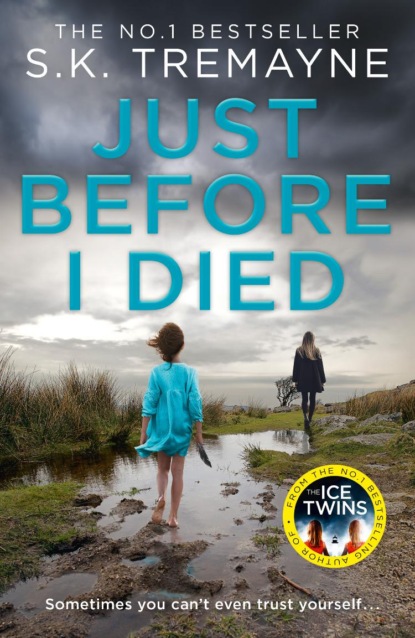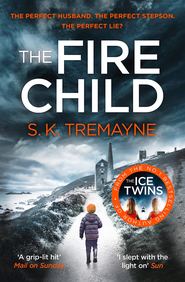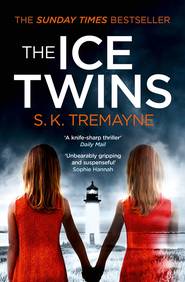По всем вопросам обращайтесь на: info@litportal.ru
(©) 2003-2024.
✖
Just Before I Died: The gripping new psychological thriller from the bestselling author of The Ice Twins
Автор
Год написания книги
2018
Настройки чтения
Размер шрифта
Высота строк
Поля
I named the dogs from a poem by Gerard Manley Hopkins. I love poetry, too: I write it occasionally, and never show it to anyone. I hide it away, as shyly as my daughter hides her secrets. I would have liked to be a poet, the way I would have liked to be an archaeologist. But that’s OK: because I am happy, I think, and certainly happy to be alive, and I live in a house I love in a place I love with a man I love and two dogs I love and, best of all, with a daughter I wholly adore.
Lyla Redway. The girl who likes to arrange dead birds in rows and curves.
Lyla Redway. The nine-year-old girl out there in the farmyard wearing a blue beanie hat and a thick black anorak, playing on her own as she always plays on her own – or with Felix and Randal, who she probably prefers to any human beings.
I don’t mind this. She’s a different sort of girl: she is herself, her vulnerable, eccentric, funny, kind, lovable self. How many kids would spend a cold frosty morning in January arranging dead birds?
Sometimes she orders stones, or twigs, or bright blood-red berries. Other times Adam comes home with presents he has found on the tors, things he knows she will like – miniature pink snail shells and delicate bird bones and bleached-white adder skulls – and she arranges these faintly macabre moorland treasures into complex patterns: mandalas, hexagons and zodiacs, intricate visual symbols only she understands, imposing a poetic order on her lonely moorland world. Where she reigns supreme.
And sometimes she does nothing. She stands for hours, listening to an unheard music, seeing things invisible to others, or remembering incidents from her very early childhood. I’ve read that these strange traits, the acute hearing, and that remarkable memory, are all part of her condition, almost proof of her condition. But we refuse to have her diagnosed, or examined, despite the obvious signs.
Adam doesn’t want to label her, doesn’t want to put her in a box, and I tend to agree. We don’t want to set limits on her, because she seems happy, despite her isolation, her solitude.
Though maybe less happy today?
Lyla is staring down at the birds. And standing absolutely still. This is common for her: she seems to have no middle ground of normal movement. Either she is silent and frozen, as now, or she is dancing and twirling, skipping up the moorland tors, as if she has energy she cannot endure, waving her hands, nodding and rocking, and talking talking talking, chattering like the River Dart under Postbridge, nattering away to herself, a babble of information stored in her brain from all the books she reads.
Hyperlexia, they call it. Another symptom. Reading too much.
How can that be a thing? Reading too much? I let her read as much as she likes. Entire books in a day, thousands of words every hour. Filling up her hungry soul. Because this is, I hope, my gift to her.
She has inherited her father’s beauty, the nearly-black hair, the piercing eyes, but she has my love for words. One day she might be the poet I never was. She might have the scholarly life I wanted. And I’m glad she got her looks from her dad rather than me. My looks have always disappointed: brown hair, brown eyes, average height, average face, nothing special to look at, just me, Kath, the woman married to Adam Redway, with the quirky daughter, does something for the National Park, lives way out in the middle of nowhere, over near Hexworthy.
Nearly dying in that reservoir is probably the one exceptional thing to have happened to me, the only thing likely to get me noticed.
Except, I don’t want to be noticed.
Opening the kitchen window to the cold morning air, I call out: ‘Hey, sweetie, are you OK? Sure you’re warm enough?’
Lyla does not move. She is still frowning at the dead birds, some of them arranged in lines like the rows of Bronze Age ritual stones out on the moors.
‘Darling,’ I repeat, but not impatiently: I am used to having to press things with Lyla, to repeat twice or three times when she is in one of her more obsessive moods. ‘Lyla-berry, I want to check you’re not cold, it’s freezing out there. Where are the dogs?’
Still no answer. I might have to go outside and literally turn her face to meet mine, to make her realize I am talking to her, that I am interacting, that a person needs a response.
Opening the front door, I walk towards my daughter, my arms crossed against the chilly breeze. ‘It’s interesting that they’re all dead, isn’t it, Mummy?’
Her eyes are bright like her father’s under the blue beanie.
‘Sorry, darling?’
‘All the birds, so many of them, all of them are dead. I checked. So many, there must be twenty of them.’
‘Probably the cold, Lyla. It’s a bitter winter, worse than usual.’ I place an arm around her slender shoulders.
‘Hm.’ She shrugs absentmindedly, stares at the birds.
I follow her gaze, examining the pitiful little corpses. They’re definitely frozen: beaks rimed with white frost. I don’t know what species they are. I can see a thrush, I think, and a robin. Lyla surely knows: she can identify every bird and every mammal, and most of the moorland flowers.
‘Well I thought it was sad, Mummy, sad that they were all dead, so I put them in a special pattern so they could all have a funeral together, and not be lonely.’ She stoops and rearranges two of the birds, delicately realigning them. It unsettles me to see her so careful, so precise. She makes such lovely patterns, but these are dead birds. Where did she get them from?
‘All right, that’s good, that’s good. Do you want some lunch?’
‘Wait. Wait, Mummy. Nearly finished.’
This elaborate game is spooking me. Dead birds arranged in a pattern I cannot quite grasp. All those glassy little bird-eyes, a trail of twinned black buttons across the frigid mud.
Lyla turns one frozen blackbird this way, and then that way.
‘Lyla! Please. Enough now.’
Straightening up, she flashes me a smile. ‘Don’t you want me to spend the day arranging dead birds? Are you saying this is inappropriate behaviour?’
I am lost for words. Until I realize my daughter is joking, teasing me about my anxieties. Lyla can exhibit startling flashes of adult humour, insightful, surreal, and self-aware. It’s one of the reasons we’ve resisted that diagnosis.
‘No, I think it’s perfectly fine to arrange loads of creepy dead birds in rows and circles.’ I laugh, and hug her again. ‘What kind of birds are they, anyway? And what is the pattern, is it a face?’
But now her head is turned, looking down the farm track, past the conifer plantation, past Hobajob’s Wood, as if she can hear something. In the far distance. I’ve known her to hear cars minutes before they arrive, long before anyone else.
‘Lyla?’
What can she hear? A raven makes a cronking sound overhead as it wheels across the dull grey sky. Yet her focus seems to be on something else, further away. What is she sensing, coming towards us, down from the tors? The memories hurt. My head stings with pain.
‘Lyla.’
No reply.
‘Lyla, what is it, what can you hear?’
‘The usual man, Mummy, the man on the moor. That’s all.’ Her words are a ghostly vapour in the cold. Her anorak is unzipped and I see she is wearing only a T-shirt underneath. She should be freezing, and yet she never seems to suffer from the cold: she likes the fierce Dartmoor winters, same as her dad. They both relish the cold. The snow. The icicles that hang from the splintered granite. ‘You know, Mummy, that if you see a lot of crows they are rooks, but a rook by itself is a crow. Did you know that?’
I reach for her once more. ‘Lyla.’
She squirms away from my touch. ‘Don’t touch me, Mummy. Leave me be.’
She is snarling. Lyla does this when she is angry or alarmed or overstimulated, she snarls, grimaces, and waves her hands. She does this at school as well: she can’t help it, but it means other children laugh at her, or are scared by her. Isolating her further. She has so few friends. She probably has no real friends.
‘Lyla. Stop this.’
‘Go away, grrr …’
‘Please—’
‘YARK!’
There’s nothing I can do. I step away, watching my daughter as she goes running to the farmyard gate, calling for the real dogs: I can hear them yapping, see our two big mongrel lurchers galloping after her.
She could be gone for another two hours now, half a day even, running across the fields, romping through Hobajob’s, hunting for that Saxon cross lost in the nettles by the brook, with Felix and Randal on each side. Adam supposedly bought the dogs for Lyla, but he loves them as much as she does. They hunt, like proper dogs. They bring back dead rabbits, necks lolling, blood dripping from their muzzles. He likes to skin these hot, reeking corpses in front of Lyla, teaching her authentic Dartmoor ways, tossing gobbets of raw meat to the hungry dogs. Eat them up, you eat them all up.







